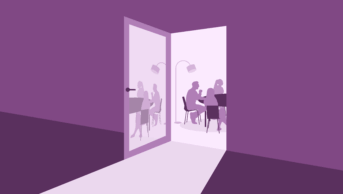Compared with the indigenous population in Britain, ethnic minority groups, and South Asians in particular, are more likely to develop type 2 diabetes, to develop it earlier and to present with complications. Glasgow has the highest ethnic minority population in Scotland and a large South Asian population, many of whom have diabetes. But knowledge of diabetes and its complications among South Asians is poor and, in many sectors of the health service, these patients have lower levels of attendance at clinics than other groups.
“We have figures for attendance levels for South Asians at pharmacist medication review clinics of less than 50 per cent compared with greater than 80 per cent for the indigenous population,” says Alia Gilani, prescribing support pharmacist for Greater Glasgow Primary Care Division. Together with Richard Lowrie, lead clinical pharmacist for the Greater Glasgow Primary Care Division, Miss Gilani decided that increasing access to health care services would be key to improving the health of these patients.
Glasgow Central Mosque
Glasgow has the largest Muslim population in Scotland. “We decided that the best way to improve access to health care services would be to hold them in a place Muslims visit frequently,” Miss Gilani says. Glasgow Central Mosque is the largest mosque in Scotland and, since prayer is one of the five pillars of Islam, has three to four thousand visitors every week.Within the mosque is an elderly day care centre, which, Miss Gilani believed, offered an ideal location for a service supporting the care of patients with chronic conditions.
“I spoke to an Asian GP I had worked with before, who was also the general secretary for the mosque, about our idea. He arranged a meeting with the manager of the mosque’s elderly day care centre, who was very receptive,” she says. Miss Gilani and Mr Lowrie therefore decided to hold a medication review clinic for elderly patients at the centre.
Most of the patients who go to the day care centre speak either Urdu or Punjabi. Since Miss Gilani speaks Urdu and understands Punjabi, she is able to talk to the patients about their medication, helping to overcome some of the cultural and communication barriers that might prevent some health care professionals from understanding these patients’ health and social care needs.
The clinics are run once a week for two hours. Each patient receives a basic medication review, along with health promotion advice, blood pressure measurement and blood glucose monitoring. Written consent is then obtained from the patient in order to access case notes. Miss Gilani informs the patient’s GP by letter of the service provided.
Once a convenient time has been arranged for Miss Gilani to access the records, a more thorough, paper-based medication review is carried out with the patient at his or her GP’s surgery. Clinical recommendations are made to the GP on a referral form and, once these have been agreed with the GP, Miss Gilani prints out a new prescription and organises any necessary blood tests with the practice nurse. She then meets the patient again at the mosque in order to pass on the prescription and explain any changes made to the medication. This is done verbally if the patient is unable to read.
“Then, if necessary, the patient is referred on to the multidisciplinary team, for instance, to secondary care, a multi-cultural counsellor, a dietitian or a podiatrist. The patient returns for follow-up monitoring visits at the mosque until target drug doses and levels are achieved for blood pressure and cholesterol, all tests necessary have been done and there are no clinical issues left,” Miss Gilani explains.
Progress
Since the project began in July last year,Miss Gilani has seen four or five patients each week. “Most of the success of the project has been down to a combination of successful communication and trust, which has built up over three years of working in surgeries,” Miss Gilani says.
A total of 58 patients have had medication reviews, 54 of whom have consented to onward referral for a full review with pharmacist access to their medical records. GPs and nurses have referred patients to the clinic and there have been a number of self-referrals from patients who have found out about the service from friends and relatives and have come to the mosque specifically asking to see Miss Gilani.
The patients seen at the mosque generally require several reviews and continuous follow up. The clinic currently has a waiting list of around 13 patients, but this is increasing as the popularity of the service grows within the community.
Next steps
Miss Gilani and Mr Lowrie have recently managed to secure extra funding from the Scottish Executive for the project and have added a community pharmacist to their team, who is able to offer additional support one day a week.
“The extra pharmacist has taken over one of my practices, allowing me to use that time to start clinics in a new surgery, and so see more patients, and pilot a project in which a community pharmacist refers South Asian patients with chronic conditions to us,” Miss Gilani says.“The patients are identified when they hand in their prescriptions and they sign a consent form allowing me to access their case-notes. I then conduct a medication review at the practice and arrange to carry out a review at the pharmacy supported by the community pharmacist,” she adds.
Miss Gilani and Mr Lowrie are keen to expand the project. “There are many other groups with health inequalities who could benefit enormously from being able to talk about their medicines to a pharmacist who understands their culture and speaks their language,” she says. “So far I have been contacted by three more organisations which have heard of the service running at Central Mosque and would like the same at their organisations.” Miss Gilani hopes that these other groups, based in a voluntary community centre, an elderly day care centre funded by social work and a Muslim women’s education centre, can benefit in a similar way to the patients using this mosque-based clinic.


